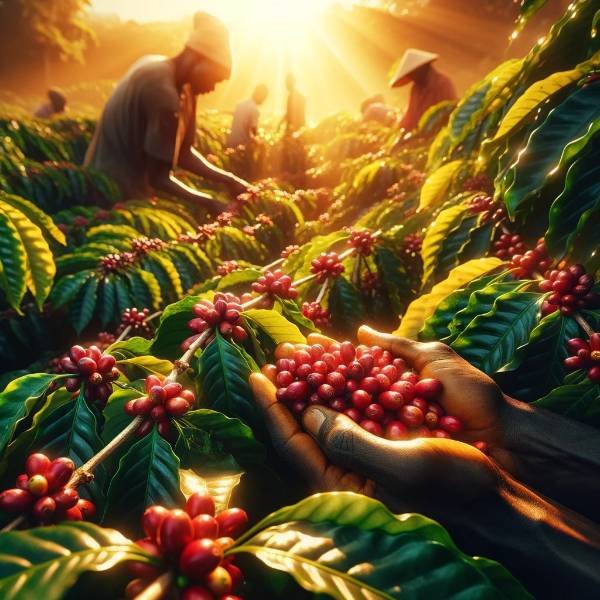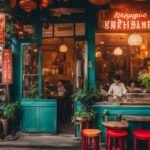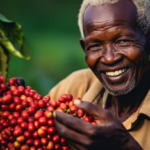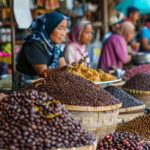Are you looking to expand your coffee horizons beyond the familiar blends and brewing techniques? You might be missing out on an incredible journey into a world filled with rich flavors and deep traditions.
The Ivory Coast, a gem in West Africa, is not just known for its breathtaking landscapes but also as a significant hub for coffee production that has remained under the radar for many.
Delving into Ivory Coast’s coffee culture uncovers a history steeped in tradition and innovation. This country was once among Africa’s leading producers of robusta coffee during its heyday in the 1970s and 80s.
Despite modern advancements, Ivorian farmers continue to harness their ancestral knowledge to cultivate beans that are cherished worldwide for their unique taste profile.
This article promises to open up the universe of Ivory Coast coffee varieties, from earthy robustas to exquisite arabicas, exploring their distinct flavors and how they’re nurtured from bean to cup.
Whether it’s understanding traditional ways or discovering where you can get your hands on these specialty coffees, we’ve got you covered.
Get ready for an unforgettable journey.
Key Takeaways
- Ivory Coast was a top producer of robusta coffee in the 1970s and 80s. Today, they blend traditional and modern methods to keep their unique coffee flavors alive.
- The country focuses on the hardy robusta variety which constitutes 80% of production, but also grows some specialty arabica beans in highland areas.
- This adds to the variety of flavors ranging from strong and bitter to sweet with fruit notes.
- Ivorian coffee culture is big both in daily life and the economy. Coffee traditions are part of social events, showing its importance beyond just being a drink.
- You can find Ivory Coast coffee through local markets, specialty shops, online retailers, or directly from plantations. This gives everyone a chance to try these special beans.
- Specialty coffees like Liberica, Excelsa, Maragogipe, Geisha, Bourbon, Mokka, and Typica show how diverse Ivory Coast’s coffee scene is. Each one offers a different taste for explorers.
History of Coffee in Ivory Coast
Coffee was first introduced to Ivory Coast by French colonists in the late 1800s. They brought Arabica coffee seedlings from nearby French colonies to plant on European-owned plantations. These early coffee farming efforts laid the foundations for what would become a thriving industry in later decades.
Commercial robusta production took off in the 1930s after the country’s forests were cleared for large cocoa farms. Ivorian farmers realized robusta coffee’s potential to flourish in the hot climate and planted it as an additional cash crop alongside cocoa.
By the 1950s and 60s, smallholder farmers expanded the nation’s coffee output using locally adapted cultivation methods. Both Arabica and robusta flourished, allowing Ivory Coast to position itself as one of Africa’s top coffee exporters in the coming decades.
Ivory Coast found its footing in the coffee world during the 1970s and 80s, becoming one of Africa’s leading coffee producers. This period marked a surge in robusta production, placing the country on the global coffee map.
As years went by, challenges and changes impacted Ivory Coast’s stake in the international coffee trade. Yet, despite fluctuations, coffee remained a cornerstone of Ivorian economy and culture.
Nestled in West Africa’s fertile stretches, Ivory Coast tapped into its rich landscapes to cultivate beans that would soon demand worldwide attention. The nation’s journey with this beloved bean reflects not just an economic triumph but a deep-rooted link to African coffee origins.
Farmers across the land honed their skills, nurturing crops that yielded beans bursting with unique flavor notes. This dedication ensured Ivorian coffee continued to be sought after globally, underpinning the country’s vibrant testament to African coffee traditions and its intricate role within the tapestry of global coffee culture.

The Ivory Coast is located in West Africa along the Gulf of Guinea. It has a tropical climate perfect for growing coffee. The southern regions have temperatures between 68-90°F year-round with a lot of rainfall. The soil found in this area is volcanic and rich in nutrients like nitrogen and potassium which coffee plants need.
The central and northern areas have fewer storms and more varied temperatures between 50-104°F depending on the season. The soil here has less nutrients. This is better for lower quality robusta beans versus high end arabica beans which grow better in the wetter southern region.
About 70% of the rural population of Ivory Coast depends on agriculture for their income. Coffee and cocoa are two of the main cash crops that contribute about 40% of the country’s total exports. The climate helps Ivory Coast produce over 2 million 60kg bags of coffee annually. Most of this is the robusta variety which withstands the hot and humid weather well.
The combination of great soil, good rainfall, ideal temperatures across different regions and an economy dependent on coffee production make Ivory Coast well-positioned to grow high quality coffee profitably. Understanding the growing conditions helps bring out the flavors that make Ivorian coffee unique.
Growing and Processing
Traditional methods
Ivory Coast’s traditional coffee production involves hand-picking ripe coffee cherries from the trees. The cherries are then sun-dried to remove moisture, a process that can take several weeks.
After drying, the beans are hulled and sorted by hand to ensure only the highest quality beans make it to market. This method reflects the country’s long-standing commitment to producing top-quality coffee through time-honored techniques.
Robusta coffee production in Ivory Coast follows traditional methods with meticulous care. Farmers grow Robusta coffee in shaded areas, paying close attention to growing conditions for optimal flavor development.
Handpicking ensures that only the best cherries are harvested, contributing to the high demand for Ivorian Robusta on international markets.
For specialty varieties, small-batch roasting is often employed using traditional drum roasters and artisanal techniques. This hands-on approach allows for precise control over temperature and timing, resulting in unique flavor profiles sought after by discerning consumers worldwide.
Modern techniques
Modern coffee production in Ivory Coast has embraced advanced methods such as mechanized harvesting and processing, leading to greater efficiency. This includes the use of modern machinery for picking ripe coffee cherries at the peak of flavor, ensuring a higher quality end product.
Additionally, modern techniques have also enhanced post-harvest processes like drying and milling, contributing to improved consistency and flavor profiles that meet global standards.
The adoption of modern techniques has not only increased productivity but also elevated the overall quality of Ivorian coffee. The utilization of advanced technology alongside traditional farming practices has positioned Ivory Coast as a competitive player in the global coffee market, attracting discerning buyers seeking high-quality beans with distinct flavor characteristics.
As demand for specialty coffees continues to rise, these modern methods are crucial in meeting international standards while preserving the distinct Ivorian coffee culture.
In Ivory Coast, coffee is traditionally grown and processed using age-old techniques passed down through generations. Modern methods have also been integrated to enhance production efficiency while maintaining the unique characteristics of Ivorian coffee. The diverse climate and terrain of Ivory Coast’s major coffee producing areas play a key role in influencing the flavors of the beans cultivated in each region. There are several major stakeholders involved in developing Ivory Coast’s coffee sector and bringing it’s high quality beans to the world.
Key Industry Players
Ivory Coast’s coffee sector involves several major stakeholders:
- The Coffee-Cocoa Council (CCC) is the government regulatory body that implements policies, standards and programs for development of the coffee and cocoa sectors. They collaborate closely with the Ministry of Agriculture.
- Le Conseil du Café-Cacao or the Coffee-Cocoa Board helps regulate coffee quality, prices and exports through close cooperation with coffee cooperatives. They also promote Ivorian coffee internationally by sponsoring trade events and fairs.
- Cooperation Internationale pour les Développements Agricoles (CIDAGRO) is an agricultural development project focused on strengthening farmer training programs and supporting sustainable coffee cultivation practices.
- Major coffee cooperatives like CECAQ, COOPAAMVC and ECOOKIM play a key role by providing smallholder farmers essential resources for coffee farming and trade channels for reaching export partners. Many farmers are cooperative members.
- Prominent coffee exporters and producers like Nestle Cote d’Ivoire, Olam Agri, Sococaf and Neumann Gruppe help bring Ivorian coffee to the global specialty coffee marketplace through responsible sourcing and supply chain development.
Coffee Regions
Ivory Coast has two main coffee producing areas – the Eastern Region and the Western Region.
The Eastern Region has a tropical highland climate perfect for growing high quality arabica beans. Located at altitudes of 2,300-5,500 ft, key growing areas here include Abengourou, Agnibilekrou and Bondoukou. The rich volcanic soil, ample rainfall and mild temperatures allow complex Arabica varieties like Typica, Bourbon and Taï forest beans to thrive. Coffee from this region is handpicked and wet processed, producing a medium-bodied, floral and fruity flavor profile.
The Western Region located below 2000 ft elevation features expansive plantations that harvest mainly robusta beans. The moist, equatorial climate sustains a diversity of robusta types like Ugandan and Ivorian robustas and the Kouilou bean, known for its distinctive spice and earthy notes. Mechanical harvesting and natural/wash processing produce the strong, bitter flavor roasted robusta beans are celebrated for.
The varied microclimates and farming practices of these two coffee territories create an array of flavors – from bright and tangy arabica profiles to intense, woody robustas – each reflecting the distinctive characteristics of their terroir.
Let’s take a deeper look into how coffee is cultivated, harvested and processed using both traditional and modern methods.
Coffee Cultivation
Ivory Coast focuses primarily on growing Robusta coffee using both traditional smallholder farming methods and large mechanized plantations.
Traditional: Farmers use time-tested techniques passed for generations. This involves sowing seeds in nursery beds first before transplanting seedlings. Canopy regulation, composting, and natural pest control help nourish the Robusta cherries.
Modern: Large plantations maximize yields via practices like high density planting, pruning for mechanized picking, targeted irrigation and fertilizer application based on soil analysis.
Harvesting and Processing
Harvesting: Pickers skilled in selective picking ensure premium flavor by timing harvests during peak ripeness from September-January when cherries transition from green to deep red.
Dry Process: Whole cherries are sun-dried immediately after harvest which activates chemical changes influencing the coffee’s sensory qualities. The dried cherries are then de-hulled before roasting.
Wet Process: A pulping machine removes skin and pulp soon after harvest. Beans are then fermented, washed, dried and stored to allow desired flavors to develop. Labor intensive but yields top grade green beans.
Influencing Factors: Sun-drying techniques, extent of fermentation, moisture content, roasting and storage protocols impact flavor. Contamination also needs vigilant control.
Control over influencing factors like sun-drying and storage allows Ivory Coast to sustain quality from crop to cup.
Flavors and Varietals
Discover the unique flavors of Ivorian coffee, from rich and bold Robusta to the delicate and aromatic Arabica. Dive into specialty coffee varieties that showcase the diverse taste profiles of Ivory Coast’s renowned beans.
Robusta vs. Arabica
In Ivory Coast, coffee production mainly focuses on the robusta variety, but there is also some production of arabica. Each type of coffee bean brings its unique characteristics to the cup. Let’s take a closer look at the differences between these two in the context of Ivory Coast’s coffee culture.
| Aspect | Robusta | Arabica |
|---|---|---|
| Flavor Profile | Strong, bitter, and nutty | Sweeter, softer, with fruit and berry notes |
| Caffeine Content | Higher | Lower |
| Bean Shape | More rounded with a straighter crease | Oval with a more pronounced crease |
| Growing Altitude | Lower altitudes | Higher altitudes |
| Economic Significance | Significant for Ivorian economy, second largest export commodity | Lesser extent in Ivory Coast, but gaining interest for specialty markets |
| Preferred Environment | Thrives in hot, humid climates of West Africa | Prefers cooler, mountainous regions |
Ivory Coast’s rich landscape offers an ideal environment for growing robusta coffee beans, a trait that has propelled the country into one of Africa’s top coffee producers, particularly during the 1970s and 80s. Despite this, arabica varieties are slowly gaining ground, appealing to a niche market interested in specialty coffee. This dual focus showcases the country’s ability to cater to both traditional and modern coffee tastes, contributing significantly to its economy and adding depth to its coffee culture.
Unique flavor profiles
Ivory Coast’s coffee beans boast unique flavor profiles, shaped by the country’s rich landscapes and skilled farmers. The region’s robusta beans offer a bold, full-bodied taste with earthy notes and hints of chocolate.
In contrast, the Arabica beans present a more delicate flavor profile, often featuring fruity undertones and a mild acidity. These distinct flavors have garnered attention in the global market, positioning Ivory Coast as a key player in the specialty coffee arena.
Additionally, the country’s diverse varieties showcase an impressive range of tastes, making it an exciting destination for coffee enthusiasts seeking distinctive and exceptional flavors.
Specialty coffee varieties
Ivory Coast offers a diverse range of specialty coffee varieties, each with its own distinct characteristics. Let’s explore further key coffee varieties cultivated in Ivory Coast and their distinct flavor profiles.
- Liberica: This rare variety is known for its bold and fruity flavors, adding a unique dimension to Ivory Coast’s coffee offerings.
- Excelsa: With its distinctive tart and fruity notes, Excelsa brings a refreshing twist to the Ivorian coffee scene.
- Maragogipe: Renowned for its large beans and smooth, nutty taste, this specialty variety is a must-try for coffee connoisseurs.
- Geisha: Offering delicate floral and tea-like flavors, Geisha coffee from Ivory Coast presents a delightful sensory experience.
- Bourbon: Known for its sweet and complex profile, Bourbon coffee adds depth to the rich tapestry of Ivorian coffee culture.
- Mokka: This specialty variety captivates with its rich chocolate undertones and hints of spice, making it a prized gem in Ivory Coast’s coffee landscape.
- Typica: With its balanced acidity and clean finish, Typica coffee embodies the essence of traditional Ivorian coffee craftsmanship.
Arabica
Grown in the tropical highland estates, Arabica thrives in cool, elevated regions. Varieities like Typica and Bourbon offer a sweet, soft profile with hints of fruit and wine. Needs careful cultivation and wet processing.
Robusta
The predominant variety makes up 80% of Ivory Coast’s coffee. Better suited to lowland heat, Robustas like Ivorian and Ugandan Robusta offer a strong, earthy flavor and creamy texture. Bring a bold character to espresso.
Kouilou
This Robusta hybrid grownmostly in the west is admired for its complex spice, tobacco and cocoa notes. Makes a full-bodied, aromatic cup.
Liberica
Liberica makes up a small portion but stands out for its woody, smoky depth paired with fruity overtones. Adds uniqueness to blends.
Coffee Culture in Ivory Coast
Discover the vibrant coffee culture in Ivory Coast, steeped in rich traditions and an integral part of daily life. Explore the unique significance and impact of coffee on Ivorian culture and economy.
Delve deeper into the traditional preparation methods and how they have shaped the coffee experience in this West African nation. For more insights, dive into our blog!
Significance in daily life
Ivory Coast’s coffee holds significant cultural and economic importance in daily life. It is a vital part of the country’s economy, being the second largest export commodity. The rich flavor notes of Ivorian coffee beans are deeply intertwined with the nation’s cultural heritage, embodying the skilled craftsmanship of local farmers.
While many poorer families consume instant coffee, the overall coffee culture reflects a rich tapestry embedded in Ivory Coast’s history and ongoing economic development.
The vibrant landscapes of West Africa provide an ideal setting for growing high-quality coffee beans in Ivory Coast. This production not only shapes daily life but also plays a crucial role in shaping global perceptions about African-grown specialty coffees, adding to its significance in both local and international spheres.
Cultural and economic impact
The rich coffee culture in Ivory Coast has a significant impact on both the country’s cultural heritage and its economic development. Coffee holds a central place in the daily lives of Ivorians, with traditional coffee preparation methods being an integral part of social gatherings and ceremonies.
The cultural significance of coffee is reflected in the country’s cuisine, with various dishes incorporating coffee flavors, showcasing its deep-rooted presence in Ivorian traditions.
Economically, the coffee sector plays a vital role as one of the country’s largest export commodities, contributing significantly to its GDP. Moreover, it provides employment opportunities for numerous individuals involved in cultivating, harvesting, processing, and trading coffee beans.
Traditional coffee preparation methods
Ivory Coast’s traditional coffee preparation methods, rooted in cultural significance and time-honored practices, have been passed down through generations. Here are the methods still embraced across the country:
- Roasting over open flames, enhancing the beans’ natural flavors.
- Grinding the roasted coffee beans using manual tools to achieve the perfect coarseness.
- Brewing the ground coffee with hot water in a special pot or container for optimal extraction.
- Adding spices such as cinnamon or cloves for a unique and aromatic touch.
- Serving the brewed coffee in small cups, often accompanied by local pastries or fruits.
Let’s explore the vibrant cafe culture and economic footprint of Ivory Coast’s coffee sector.
Coffeehouses
Coffeehouses range from old-school venues to modern specialty cafes in cities like Abidjan and Yamoussoukro. They not only serve high-quality preparations but also act as meeting spots reflecting coffee’s significance in Ivorian social life.
Economic Contributions
Coffee employs up to 20% of the workforce through its cultivation, processing, domestic trade, and export. Accounting for 12% of GDP, it brings in $2.1 billion annually as the nation’s second largest export behind cocoa. The majority comes from small farms showcasing the industry’s inclusivity.
Prices and margins vary widely across the supply chain from farm to consumer, but cooperative bulk exports help secure fair rates.
Where to Buy Ivory Coast Coffee
Explore local markets, specialty coffee shops, online retailers, and direct from plantations to get your hands on authentic Ivory Coast coffee. Embrace the opportunity to savor the rich flavors and bring a piece of Ivorian coffee culture into your daily life.
Local markets
Ivory Coast’s local markets are bustling hubs where you can immerse yourself in the country’s rich coffee culture. Here, you can find an array of freshly roasted beans and witness traditional coffee preparation methods firsthand.
The vibrant atmosphere and aromas will give you a true taste of Ivory Coast’s love for coffee.
From local markets, let’s explore the specialty coffee shops that have become havens for both locals and visitors seeking to indulge in the diverse flavors of Ivory Coast’s coffee varieties.
Specialty coffee shops
When you’re looking for a more curated coffee experience, specialty coffee shops in Ivory Coast offer a diverse selection of high-quality beans and unique brewing methods. These establishments are often found in urban centers, where coffee culture is thriving.
You’ll find an array of single-origin coffees showcasing the country’s distinct flavor profiles, giving you the opportunity to savor the rich diversity of Ivorian coffee. With knowledgeable baristas and a focus on quality, these specialty coffee shops provide an immersive journey into Ivory Coast’s vibrant coffee culture.
In addition to serving exceptional brews, these cafes also contribute to the local economy by supporting small-scale farmers and promoting sustainable practices within the industry.
Online retailers
You can easily buy Ivory Coast coffee from online retailers. These platforms offer a convenient way to access the rich varieties and specialties of Ivorian coffee, allowing you to explore and indulge in the unique flavors.
The demand for Ivory Coast coffee beans is high due to their distinct taste profiles and the expertise of local farmers who cultivate them, making these online retailers an ideal source for experiencing the authentic flavors of this West African treasure.
Direct from plantations
Purchase Ivory Coast’s finest coffee directly from the plantations for a truly authentic and fresh experience. By buying directly, you support local farmers and savor the unique flavors of this West African gem.
The direct purchase also ensures that you receive high-quality beans with distinct flavor profiles, contributing to the preservation of traditional coffee farming in the Ivory Coast.
Conclusion
Explore the rich coffee culture of Ivory Coast, from its historical significance to its impact on the economy. Discover traditional and modern coffee growing and processing techniques in this vibrant region.
Uncover Ivorian coffee’s unique flavors and varieties, including the distinction between Robusta and Arabica. Immerse yourself in the everyday significance of coffee in Ivorian life, from cultural practices to economic contributions.
Find your own piece of Ivory Coast’s rich coffee heritage through local markets, specialty shops, or direct plantations. Take a journey into a world where every cup tells a story of tradition, flavor, and economic growth.
FAQs
1. What makes Ivory Coast’s coffee culture special?
Ivory Coast’s coffee culture is unique because of its rich history, diverse coffee varieties, and the specialty coffees produced in the region.
2. Can you tell me about the types of coffee grown in Ivory Coast?
In Ivory Coast, farmers mainly grow Robusta coffee. However, they also produce several specialty coffees that are known for their unique flavors.
3. How did coffee become popular in Ivory Coast?
Coffee farming started in West Africa hundreds of years ago. Over time, it became a big part of Ivory Coast’s economy and culture, especially in cities like Abidjan.
4. Are there any traditional ways to enjoy Ivorian coffee?
Yes! In Ivory Coast, people have created their own coffee traditions and dishes that showcase the rich flavors of their local beans.
5. What role does Ivory Coast play in the global coffee trade?
Ivory Coast is an important player in the world’s coffee trade due to its robust production of Robusta beans and its growing specialty coffee industry.






